In the fast-paced world of healthcare, where decisions can have life-altering consequences, the terms “accountability” and “responsibility” often get thrown around interchangeably. However, these two concepts, while closely related, carry distinct meanings and implications. Understanding the difference between them is crucial for fostering a culture of excellence and patient safety.
Responsibility: The Foundation of Healthcare
At its core, responsibility refers to an individual’s obligation to perform certain tasks or duties to the best of their ability. This means delivering competent and ethical care to patients, following professional standards and institutional policies. Every healthcare professional, from doctors and nurses to pharmacists and technicians, carries this inherent responsibility.
Accountability: Taking Ownership of Outcomes
Accountability goes a step further. It implies not just being responsible for one’s actions, but also being answerable for the consequences of those actions. This means being willing to take ownership of mistakes or errors, showing a commitment to learning from them and taking steps to prevent them from happening again. It also involves actively seeking feedback and being open to constructive criticism.
The Role of Managers
In ensuring a culture of accountability thrives, nursing and pharmacy managers play a vital role. Their responsibilities include:
- Creating clear expectations: Setting clear expectations for performance, outlining professional standards, and ensuring all staff are familiar with relevant policies and procedures.
- Providing ongoing support: Offering regular training and mentorship opportunities to enhance skills, knowledge, and confidence.
- Implementing effective communication and reporting systems: Facilitating open communication channels for reporting errors and concerns without fear of reprisal.
- Holding individuals accountable: Addressing performance issues fairly and constructively, implementing corrective action plans when necessary, and celebrating successes and achievements.
- Promoting a culture of continuous improvement: Fostering an environment where learning from mistakes is encouraged and seen as an opportunity for growth and improvement.
Benefits of a Culture of Accountability
Creating a culture of accountability in healthcare settings offers numerous benefits:
- Improved patient safety: When individuals are held accountable for their actions, it reduces the risk of errors and promotes a safer environment for patients.
- Enhanced quality of care: Accountability fosters a commitment to best practices and adherence to standards, leading to consistently high-quality care.
- Increased trust and transparency: Building a culture of open communication and accountability strengthens trust between patients, healthcare professionals, and administrators.
- Professional development: When individuals are held accountable for their performance and given clear feedback, it encourages them to identify areas for improvement and actively pursue professional development opportunities.
Conclusion
Accountability and responsibility are intertwined pillars of professional practice in healthcare. Understanding the distinct roles they play is crucial for building a culture of excellence and patient safety. By fostering accountability through clear expectations, ongoing support, effective communication, and continuous improvement efforts, managers can empower their teams to deliver the highest quality of care and ultimately improve the lives of the patients they serve.








